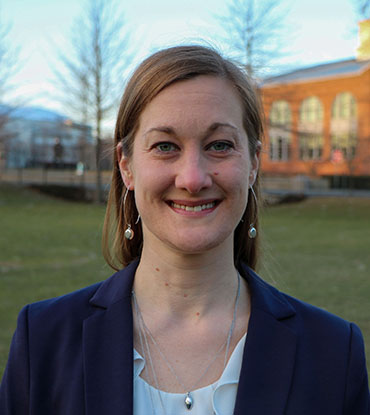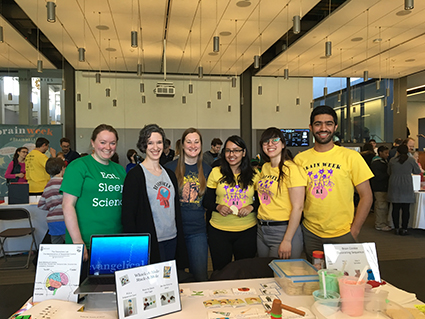Theresa McKim, Ph.D. is a graduate of our Behavioral & Integrative Neuroscience program under Dr. Charlotte Boettiger in the Department of Psychology and Neuroscience. She is currently a National Institute on Drug Abuse Postdoctoral Research Fellow in The Desrochers Lab in the Department of Neuroscience at Brown University.
 As a postdoc in the lab of Dr. Theresa Desrochers, Theresa works on research that is focused on understanding similarities and differences across species in how the brain helps represent and keep track of sequential information. Many years of research has focused on understanding motor or movement sequences in the brain, but researchers know very little about how the brain is able to represent more abstract sequences of behaviors performed in daily life. This includes examples of routine behaviors such as monitoring directions while driving and making coffee, to following new recipes or winging it while cooking.
As a postdoc in the lab of Dr. Theresa Desrochers, Theresa works on research that is focused on understanding similarities and differences across species in how the brain helps represent and keep track of sequential information. Many years of research has focused on understanding motor or movement sequences in the brain, but researchers know very little about how the brain is able to represent more abstract sequences of behaviors performed in daily life. This includes examples of routine behaviors such as monitoring directions while driving and making coffee, to following new recipes or winging it while cooking.
Using learning methods from her graduate training, Theresa’s research interests are focused on how the brain is able to flexibly shift from goal-directed to habitual behavior, which has important implications for addiction. During her graduate training at Carolina, Theresa used physiology methods to measure stress induction in humans (heart rate, salivary cortisol), human functional magnetic resonance imaging (fMRI) methods, and noninvasive brain stimulation with transcranial alternating current stimulation (tACs). Theresa says, “In my current role, we utilize both human and animal fMRI to conduct cross-species comparisons of brain structure and function, using similar behavioral tasks in both humans and animals. I have also continued learning brain stimulation methods, and have added training in the use of transcranial magnetic stimulation (TMS) to my repertoire of skills to more causally probe brain function in humans.”
One area of research involves better understanding the brain and behavior relationships in disorders such as obsessive-compulsive disorder (OCD). While studies have demonstrated that brain stimulation with TMS can improve symptoms of OCD, researchers are still only beginning to understand how this results in changes at both the level of the brain areas and circuits stimulated, as well as how this plays a major role in shaping behavioral change. Theresa shares, “My ultimate research goal is to combine my training in various research methods (such as fMRI and TMS) to better understand neurobiological disorders and develop novel treatment options for disorders such as addiction and OCD.”
Her postdoctoral fellowship in the Desrochers’ Lab was a natural fit for Theresa, as her graduate research focused on studying addiction in humans. “Combined with the coursework, interdisciplinary training stemming from the department, medical school, and Bowles Center for Alcohol Studies, and along with the collaborative nature of interacting with such a broad range of scientists, these interactions helped to prepare me for thinking about and conducting cross-species work,” explains Theresa. “This led me to seek out further opportunities in my career to answer questions about the brain and use a comparative approach to answer questions with neuroimaging methods such as fMRI. The ability to think critically about neuroscience questions and how best to tackle these from multiple perspectives enabled me to pursue a postdoc and be competitive for receiving a NIDA postdoctoral research fellowship. It also ideally situated me to join and work in a lab in my postdoc that is only one of a handful across the world that employ cross-species fMRI research methods!”
Theresa began her journey to graduate school by first working as a lab manager and gaining skills in neuroimaging and studying the relationship between reward processing and smoking behavior. This experience inspired Theresa to pursue a Ph.D. and to further her study of the neurobiology of addiction. She shares, “I remember my feeling of excitement when I came across Charlotte’s lab website – her lab used similar methods to what I was currently doing, and studied addiction from multifaceted lines of work that capture a variety of risk factors for addiction. I was excited to learn and contribute to these areas in order to make progress in the field for novel behavioral therapeutic approaches for addiction.”
Not only was she interested in working with the faculty at Carolina, Theresa was intrigued by the training opportunities and benefits that the BIN Doctoral Program at Carolina offered her, including the National Institute on Drug Abuse T32 Predoctoral Training Grant in Addiction Science. This training grant allowed Theresa time to focus on research exclusively during her first few years as a graduate student. “The training grant also demonstrated that the expertise of the faculty within the program is dedicated to studying drugs of abuse, the area I wanted to pursue, and demonstrated to me that they would be great mentors to learn from,” explains Theresa.
Theresa enjoyed her time as a graduate student at Carolina, particularly in regards to her research training. She says, “I feel that my training was truly interdisciplinary and I was fortunate to also have Dr. Donita Robinson (Dept of Psychiatry and Bowles Center for Alcohol Studies) as a mentor throughout my PhD training. I was able to see the importance of collaboration and team science while contributing intellectually to projects that both Charlotte and Donita were pursuing in collaborative grants. This was also essential for learning about and demonstrated to me first-hand the importance of cross species work in humans and animal models in the study of addiction during my training. This greatly inspired my plans for pursuing a postdoc and ultimately contributed to my choice to work in my current lab that employs both human and animal cross species fMRI.”
 Theresa also found her passion for engaging in outreach while she was at UNC. “While I learned a lot about research and received invaluable training for my current position, I also learned the importance of giving back. Because I was able to collaborate with Donita and others at the Bowles Center for Alcohol Studies, there were ample opportunities for me to be involved in outreach activities within the community,” she says. “I was able to not only participate in annual Brain Awareness Week events at the Museum of Life and Science, but I contributed to the development of new activities for these events to engage with children and adults. I also participated in other community education events related to alcohol and addiction awareness and visit classrooms in local schools to teach about the brain during Brain Awareness Week.” This is an interest Theresa has continued in her postdoctoral fellowship in Providence and has had the opportunity to engage in the community through events like Brown University’s Brain Awareness Week and also works to make her lab’s research accessible to the public.
Theresa also found her passion for engaging in outreach while she was at UNC. “While I learned a lot about research and received invaluable training for my current position, I also learned the importance of giving back. Because I was able to collaborate with Donita and others at the Bowles Center for Alcohol Studies, there were ample opportunities for me to be involved in outreach activities within the community,” she says. “I was able to not only participate in annual Brain Awareness Week events at the Museum of Life and Science, but I contributed to the development of new activities for these events to engage with children and adults. I also participated in other community education events related to alcohol and addiction awareness and visit classrooms in local schools to teach about the brain during Brain Awareness Week.” This is an interest Theresa has continued in her postdoctoral fellowship in Providence and has had the opportunity to engage in the community through events like Brown University’s Brain Awareness Week and also works to make her lab’s research accessible to the public.
Another aspect of the training program at UNC that Theresa was excited to pursue was the opportunity to independently teach a course as a graduate teaching fellow. Theresa taught undergraduates a course on Biopsychology. “This class for me in undergrad was very influential in highlighting my interest in, and my desire to pursue research in neuroscience,” shares Theresa. “I found the course material and topics fascinating, and felt that if I would have the opportunity to teach it, maybe I could also inspire young minds to be interested in and/or pursue neuroscience research topics like I was.”
Our Meet an Alum series spotlights alumni from our six doctoral programs in the Department of Psychology and Neuroscience, including Behavioral & Integrative Neuroscience, Clinical Psychology, Cognitive Psychology, Developmental Psychology, Quantitative Psychology, and Social Psychology.
Graduates from our Department are part of an extraordinary roster of alumni. We’re proud of our alumni and their accomplishments as knowledgeable leaders in their fields. Become inspired by the possibilities and meet more of our alumni online!

